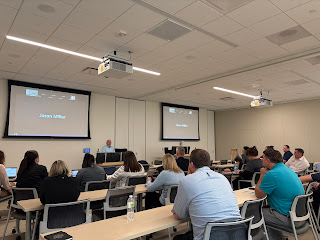Understanding the Patient Experience
By: Matt Knoedel, MHA '17
 |
| Paige Moore (MHA '10, right) and Carol Ayangbile (MHA '13, second from right) offer feedback to first-year MHA students on a case study in patient experience. |
Imagine having your elderly mother
fall ill and need to be hospitalized. You are terrified, you don’t know what is
wrong with your mother and no one is able to tell you. Over the next couple
days, she is shuttled between the hospital and her nursing home. As her
condition becomes worse, she becomes hospitalized again. She is hooked up to some
strange machines and becomes violently ill with an infectious disease. As she
becomes more and more sick, the staff tell you they want to put her in hospice
care. You don’t fully understand what this means and when you meet with the hospice
nurse, she rudely asks “What do you need to know?” in an uncompassionate tone.
You decide to use another hospice service nurse who explains more about hospice,
but you are still worried. Your mother’s doctor indicates that she is stable
enough to return to her nursing home. On the way, your mother passes away. You
are informed over the phone from her hospice nurse who says she never should
have been transported in her condition.
This is
based off a real-life scenario. This really happened to someone. There were so
many opportunities in which the hospital staff could have been more caring and compassionate,
but they weren’t.
When we use the term “Patient
Experience” this is what we are talking about. At one point or another, we will all be a patient or have a relative who is a patient. This topic is so
important – we need to imagine that each patient is someone else’s mother,
father, sibling or cousin.
In our weekly Professional
Development Seminar meeting on April 28, two MHA alumnus (Paige Moore, Patient
Experience at UnityPoint Health-Des Moines and Carol Ayangbile, Patient Experience
Director at Unity Point-Quad Cities) came to talk with 1st and 2nd
year MHA students about the patient experience.
We learned about some of the
foundational principles of patient experience in use at UnityPoint Health,
including AIDET, a no point policy, and managing up. AIDET is a customer
excellence strategy and stands for Acknowledge, Introduce, Duration,
Explanation, and Thank you. Strategies like AIDET help to make the hospital
experience a little less frightening for patients.
Both Paige and Carol shared some of
the programs in place to improve patient experience in their respective
locations. For instance, in the Quad Cities, a patient experience specialist
provides updates at huddles to reinforce patient experience strategies. At the
Des Moines location, employees practice narrating care and hourly rounding to
make sure the patient is informed and knows what care they are getting and why.
After discussing these strategies,
we broke into groups to discuss a case study, which was the scenario described
above. We identified opportunities for improvement in patient experience and
ways we could have provided real-time service recovery. After the case study,
we were able to ask Paige and Carol questions about patient experience, their
current roles, and their path after graduating the program. Their perspectives
and backgrounds in patient experience were enlightening and invaluable for our
class.



Comments
Post a Comment